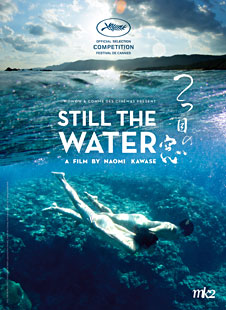STILL THE WATER
US Premiere • Drama • France, Japan, Spain 2014
DCP • 2.35 • Dolby 5.1 • Color • 118 min
Directed by: Naomi Kawase
Written by: Naomi Kawase
Cinematography: Yutaka Yamazaki
Film Editing: Tina Baz Le Gal
Original Score: Hasiken
Produced by: Masa Sawada (Commes des Cinémas)
Coproduced by: Arte France Cinema, Wowow, Asmik Ace, Kumie, Pony Canyon, Luis Miñarro
Cast: Jun Yoshinaga, Nijiro Murakami, Tetta Sugimoto, Miyuki Matsuda, Makiko Watanabe
International Sales: MK2
This 2014 Palme d’Or nominee is a lyrical and visually arresting rumination on the meaning of love, life and death set in the exotically verdant Japanese island of Amami. The quiet story centers on Kaito and Kyoko, 16 year-old classmates whose nascent sexual awakening is put on hold by a heavily tattooed corpse that washes up after a typhoon. The sudden intrusion of death reinforces Kaito’s fear of the sea but the more adventurous Kyoko sees the body as a mystery to be solved. Both have troubled home lives. Kaito’s divorced mother is too busy earning a living to give him the attention he needs, while Kyoko struggles to accept her mother’s terminal illness, especially since her mother is a revered shaman. When Kaito discovers his connection to the dead body, he is forced to re-examine everything that he has taken for granted in his life. Still The Water is an intensely personal yet universal glimpse into Japan’s folkloric traditions, where coming-of-age means coming to terms with the unity of nature.
The themes of death, mysticism, and the cycles of nature have been the principal preoccupations of writer/director Naomi Kawase, even in her early documentaries and shorts. Kawase became the youngest recipient of Cannes’ Caméra d’Or with her 1997 debut feature Suzaku. Since then nearly all of her features have enjoyed premieres at Cannes, including The Mourning Forest (2007), which won the Grand Jury Prize. An accomplished writer, Kawase novelized both Suzaku and her second feature, Firefly (2000). As with many of her films, Still The Water has autobiographical elements, coming just after the death of Kawase’s foster mother, and set on her ancestral island. Masa Sawada’s Paris-based production company, Commes des Cinémas, which has been making films with close ties to Japan since 1993, produced the film.
Quotes:
“…a spectacle for the senses”
– Nikola Grozdanovic INDIEWIRE
“…a fluid, dreamlike tone poem of mothers and fathers, death and continuance.”
– John Bleasdale CINEVUE
“Kawase's distinctive serenity and generosity of spirit remain valuable qualities in the cinema.”
– Peter Bradshaw THE GUARDIAN





